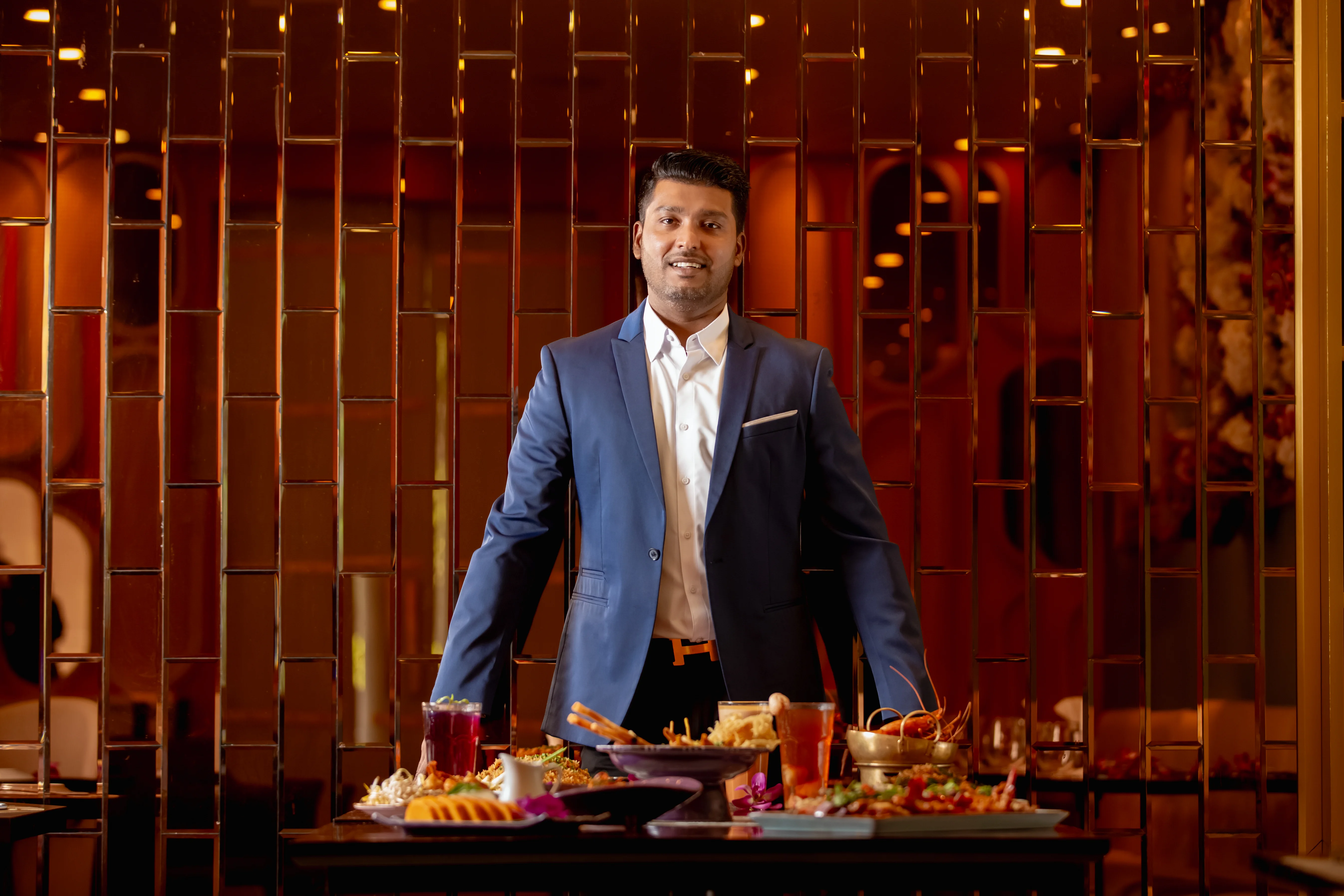
Cinematic Reinvention | A Candid Conversation with Naveed Cader
With deep familial roots in hospitality and film, Cader’s jour ney is one of calculated reinvention—marked by discipline forged in sports, refined through corporate grit, and driven by a purpose far beyond profit. In this candid conversation, he shares the origin story behind Scope Cinemas, the cultural and business shifts he’s navigating, and the legacy he hopes to shape—not by clinging to the past, but by building something refreshingly new.
Naveed, before founding Scope Cinemas, what shaped your journey early on?
I spent my early years at Royal College before completing my O-Levels and A-Levels at Stafford International and Asian International School, respectively. But it was sports that truly defined that stage of my life. Swimming and squash taught me discipline, resilience, and the ability to stay grounded—qualities that continue to guide me today.
What drew you back to Sri Lanka after your studies?
After graduating from the University of Essex in 2009 with a BSc in Management Economics, I felt a strong pull to return home. The civil war had just ended, and I wanted to be part of a new era—to contribute to something that would uplift the way we live, experience, and connect as Sri Lankans. That sense of purpose outweighed any ambitions abroad.
Did you immediately join the family business when you returned?
In our family, there has always been a principle of earning your place. I started my career at Aitken Spence Travels and Hotels, immersing myself in the core of hospitality. I worked across departments, learning the nuances of travel and accommodation. That experience instilled in me the value of professionalism, integrity, and leadership from the ground up.
“We believed in creating spaces where people didn’t just consume content—they experienced something memorable.”
When did you step into the family business?
After several years of hands-on learning, I joined our family-owned hotel in Colombo. I was entrusted with marketing and later led the sales function, working to modernize systems, understand evolving customer expectations, and create a results-driven culture. It was a period of growth that shaped my ability to think strategically and lead with purpose.
What made you pivot from hospitality to cinema?
While I valued my experience in hospitality, I began to feel a deeper restlessness—a sense that my contribution could take a new shape. I wanted to push beyond the familiar and identify where I could add something transformative to our legacy. Around that time, I discovered the lease for Liberty Cinema was nearing its end. It wasn’t just a business opportunity; it felt personal. This cinema had deep roots in our family’s history, and the idea of reimagining it ignited something in me. The more I explored the possibilities, the more convinced I became that cinema—an industry both nostalgic and full of potential—was where I could lead our next evolution. What began as a moment of introspection soon took form as a bold vision to reinvent the movie-going experience in Sri Lanka.
What inspired you to focus on elevating the cinema experience?
My university years in the UK left a lasting impression. Movie nights weren’t just about watching a film; they were an experience—a ritual of comfort, quality, and ambiance. Returning home, I saw a stark contrast. The fundamentals of a good cinema experience simply weren’t there. That’s when it became clear: if we could fix the basics, we could transform the industry. Scope Cinemas was born out of that simple yet powerful belief.
“Profit follows purpose. What drives me is the knowledge that we are adding value to people’s lives—even in the smallest of ways—through what we build every day.”
How did you execute this vision despite the dominance of larger players?
Even with long-established players in the market, there was room to rethink the fundamentals. Many cinemas were still functioning as basic halls—where the focus remained solely on the film itself, rather than the full experience surrounding it. Seating lacked comfort, audio and visual quality felt dated, and the overall environment didn’t match the emotional engagement that cinema inherently invites. The basics simply weren’t being done right.
With the backing of the family, we began by renovating Liberty Cinema—a symbolic and strategic first step. From seating to sound, screen quality to service, every detail was approached with intention and care. The goal wasn’t just to build another cinema, but to elevate how people felt from the moment they walked in to the moment they left. We believed in creating spaces where people didn’t just consume content—they experienced something memorable. That clarity of vision, anchored in quality and emotional resonance, has guided Scope Cinemas ever since.
Looking back, would you have done anything differently with Scope Cinemas’ journey?
Not at all. The journey has been filled with hard-won lessons. Each challenge was an opportunity to grow, to refine, and to reaffirm our purpose. Even during the uncertainty of COVID-19, we remained agile, choosing to innovate instead of pause. Those moments shaped our resilience and reaffirmed why we do what we do.
With the rise of streaming, many see cinema as a dying industry. What’s your take?
Streaming has undoubtedly changed the landscape, but cinema is far from obsolete. It’s like comparing food delivery to fine dining—both serve a purpose, but the experience is different. The communal energy, the immersive sound, the anticipation as lights dim—you can’t recreate that at home. Studios are beginning to understand that the theatrical run still holds unmatched cultural and commercial value.
How are you incorporating technology into the cinema space?
At Scope Cinemas, innovation has always been core to our brand. From our investment in IMAX and Dolby Atmos to improving digital interfaces like our mobile app, technology enables us to enhance every aspect of the customer journey. Behind the scenes, we use data analysis to better understand our audience and tailor our offerings. The future of cinema will be powered by both storytelling and smart infrastructure.
Any thoughts on Scope Cinemas stepping into content creation?
Absolutely. Storytelling is what brought us here. While cinema exhibition is our foundation, content creation is on our horizon. Sri Lanka is home to incredible talent and powerful stories. We want to help take those narratives to the global stage. But to do that, the ecosystem needs to mature—it requires collaboration, investment, and shared vision. We hope to be part of that transformation.
You spoke earlier about your grandfather and father’s legacy. What does legacy mean to you now?
Legacy, to me, is a privilege and a responsibility. My grandfather, the late Mr. Jabir Cader, was not just a pioneer in cinema and a visionary in hospitality; he was a statesman, serving both as a Member of Parliament and as the Mayor of Colombo. A man of rare foresight and tenacity, he laid the foundation for private enterprise in a time when few dared to imagine the possibilities. My father inherited that legacy and carried it through the most turbulent periods in Sri Lanka’s modern history. Amidst civil unrest and economic uncertainty, he kept the dream of cinema and hospitality alive—not merely as businesses, but as beacons of community and continuity. Their achievements are not just chapters in our family’s story; they are pillars upon which I stand. Legacy is not a script to repeat, but a spirit to build upon—with purpose, conviction, and an unwavering commitment to progress.
Finally, what drives you today?
Purpose. Whether it’s through Scope Cinemas or Food Studio, my mission is to create experiences that matter. We want people to feel something, to remember it, and to return to it. Profit follows purpose. What drives me is the knowledge that we are adding value to people’s lives—even in the smallest of ways—through what we build every day.

